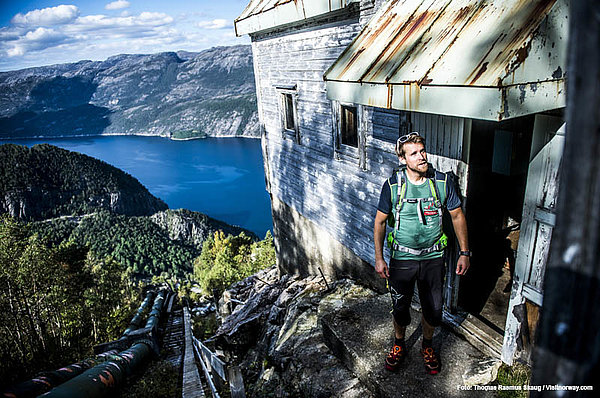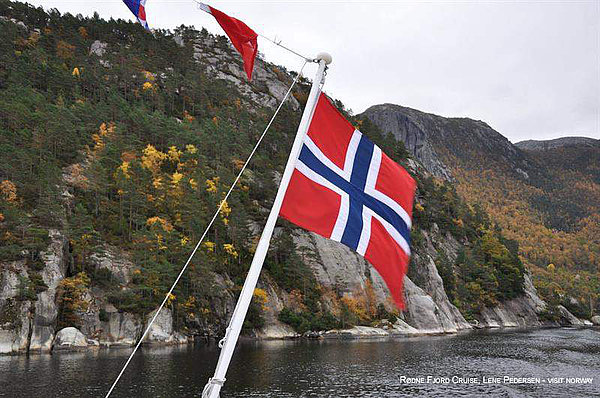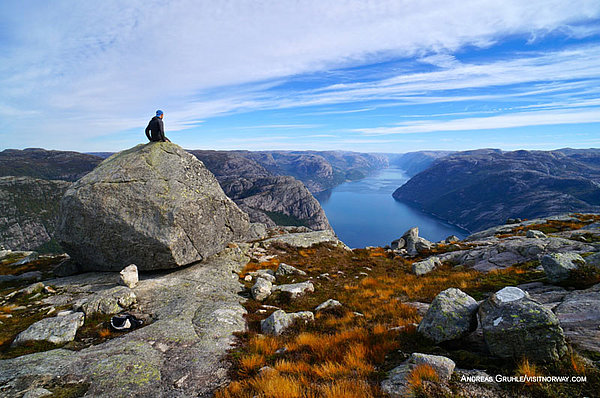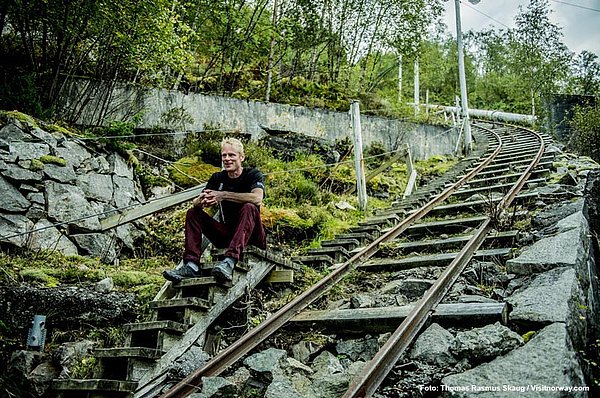Outdoor Life Norwegen – Unser Partner für geführte Wandertouren in der Lysefjord Region
Der Lysefjord ist eine Spielwiese für richtige Outdoor Enthusiasten. Unser Partner Outdoor Life Norwegen aus Stavanger bietet in dieser fantastischen Region Wanderliebhaber geführte Touren im Sommer sowie im Winter an. Abseits der touristischen Trampelpfade, mit viel Respekt vor der Natur, geht es auf Tages- oder Mehrtagestouren zu den Highlights am Lysefjord: Preikestolen, Kjerag and Flørli.
Die professionellen Wanderführer sind bestens ausgebildet und kennen die Region wie ihre Westentasche. Die Wandergruppen werden mit wenigen Teilnehmern zusammengestellt. Für die Guides ist ein harmonisches Zusammenspiel aus Gast, Natur und Guide die Grundvoraussetzung eines einzigartigen Naturerlebnisses.
Der Gründer Johannes C. Apon hat seine Firma 2014 ins Leben gerufen. Er besitzt einen Master Abschluss im Naturgebunden Tourismus Management (NMBU) und ist zertifizierter Arktischer Natur Reiseführer. Zusammen mit seinen Angestellten hat er eine Guide Philosophie entwickelt unter der die geführten Wandertouren organisiert werden.
Wir sind stolz darauf Ihnen die Wandertouren von Outdoor Life Norwegen vermitteln zu dürfen. Kontaktieren Sie uns. Wir finden für Sie die beste, geführte Wandertour oder organisieren Ihnen ein komplett individuelles Wandererlebnis:
“ THE GUIDE ROLE & VALUE-BASED GUIDING
Why do we need guides when we are in the outdoor?
The guide role can be divided in two: traditional ‘pathfinding’ – geographically leading guests through unknown or inaccessible terrain – and ‘mentoring’ – guiding guests towards insight and enlightenment (Cohen, 1985).
When in the outdoors, it is crucial that we master basic technical skills necessary and ensuring we are travelling in a safe matter. It is the guide’s task to control and reduce risk. Safe guiding builds on planning, hard technical and safety skills, routines, guest instructions and the ability to handle emergency situations. Only when we are safe it becomes possible to draw our attention to a deeper interaction with our fellow travelers and nature. To satisfy guests and meet expectations, guides must master the soft skills of guide-guest interaction, group management and hostmanship, including basic fact knowledge and stories to tell. But the guide role does not stop there.
Our modern society is highly dependent on technology. Many people are now living in urban areas, with reduced access and opportunities to interact with nature. Buying our food at supermarkets or take-away’s, and having all facilities at hand, might lead to the illusion that we do not need nature any more. Is this true? Do luxury, money and comfort make us happier?
The values of the Norwegian outdoor traditions of friluftsliv are based on the fact that nature has an intrinsic value, and that friluftsliv is a ‘way home’ for humans by means of touching and being touched by nature. Being physically active in nature gives us peace and silence and may arouse feelings of achievement, belonging and happiness. Just think of your feelings after reaching a mountain top, the sight of a waterfall, skiing down a mountain side or staring at a bonfire.
However, taking people in the outdoors for money may have its cons. Commercial activities might lead to treating nature as a machine. Tourism often entails travel by plane or other environmental unfriendly transportation. We are using more high-technology equipment and clothes, and social media pressure has caused that many people perceive the world through their mobile camera’s and are more worried about the number of likes they will generate, than the beauty of nature itself. Popular areas might get congested, littered and damaged.
So, guides can play an influential role on the environmental impacts as well as guests’ awareness and behavior. Guides are no longer pathfinders – maps, routes and information are widely found on the internet – but interpreters: helping people to find meaning in what they see, opening their eyes.
”Through interpretation, understanding; through understanding, appreciation; through appreciation, protection” Tilden (1977)
”not with the names of things, but by exposing the soul of things – those truths that lie behind” Tilden (1977)
Interpretation is more than spitting out information, and involves communication, education and entertainment skills. It is about revealing the big picture beyond what we show our guests,
Interpretation is a form of value-based guiding, based on personal attitudes and ideas. Through their interaction with guests and nature, guides are being given both the opportunity and responsibility to communicate and convey nature values to their guests. This can enhance the guests’ experience, contribute to learning and transformation, and ultimately influence people’s values, attitudes and behavior towards nature. Most important is that the guide role and interaction with guests is not performed randomly or as a standardized product, but according to a plan with a clear message and goal. The aim is that the guests’ physical and mental exploration of the Norwegian nature will lead to a discovery of a higher meaning, turning guests into environmental ambassadors, and contributing to minimizing negative effects.
It is our personal goal to get more people out and closer to nature. Instead of “been there, done that”, it is our hope that people will say “been there, loved it, it changed me”. “



